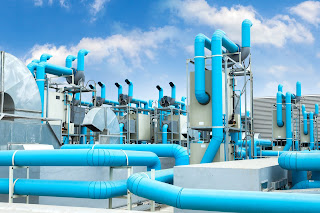How can you maximize the lifespan and reduce maintenance on your commercial heating system? A few simple procedures once a month can reduce repair needs and cost over the life of your system, and extend its life. As an added bonus, these easy tasks can also save energy, reducing your business’ carbon footprint. Sadly, only one-third of businesses fail to perform these easy tasks.
How Can You Extend the Life of Your Commercial Heating System?
- Have a maintenance plan.
Whether you handle basic AC maintenance in-house or prefer signing up for regular maintenance service with your local commercial HVAC service contractor, routine annual maintenance is crucial to the health of your system. Every missed maintenance equates to money lost – money that could have been reinvested into your business. - Add monthly maintenance to your business calendar.
Set aside one day each month to perform HVAC maintenance tasks – and stick with it. Keep a log of maintenance performed, including:- Checking & replacing the air filter
A high-quality air filter can minimize indoor air quality problems related to dust, mold, and allergens. These include issues that affect the health and performance of your employees, and the health and performance of your system. Ensure well-being by checking your filter monthly. Once it is dirty, it should be replaced immediately, at least once every 6-months. When you do change it, keep a log, recording its condition with photos if possible. - Verify the cleanliness of coils & clean them when necessary
Once the filter is changed, visually inspect evaporator coils for the accumulation of dust, dirt, or mold. This is a high-moisture environment, prone to such issues. Following this, examine the condenser coils located in your outside unit. If one (or both) appears dirty, schedule a professional cleaning. To avoid costly system damage, this job is best left to professionals. Log any activity for later reference. - Keep the area surrounding your system clean
Your system relies on adequate airflow for optimal performance. Each month, when you’re checking other system components, ensure the areas surrounding key system components are clear. Return registers should be unhampered by furniture, trash, or other debris. Your outdoor components should also be clear of grass, weeds, leaves, and trash that can stick to the motor or fan blades.
- Checking & replacing the air filter
- Schedule an annual inspection.
Scheduling an annual maintenance inspection in the fall, before your system undergoes the stress of winter weather extremes, is crucial. A heating professional can ensure your system is running safely and efficiently. Furnaces can be checked for proper combustion and ventilation, ensuring your staff is safe from carbon monoxide dangers. Ducting can be checked for leaks to ensure optimal system performance. System components, ductwork, and dampers can be checked for dirt accumulations that can negatively impact efficiency and indoor air quality. Potential issues can also be headed off at the pass, preventing the need for inconvenient and costly emergency commercial HVAC repairs later.
Keep your commercial heating unit in tip-top shape, reducing breakdowns and boosting energy efficiency. Schedule your annual maintenance check with H & H Commercial Services today.
This blog was originally posted at https://hhcommercialonline.com/tips-for-extending-the-life-span-of-your-commercial-heating-system/


